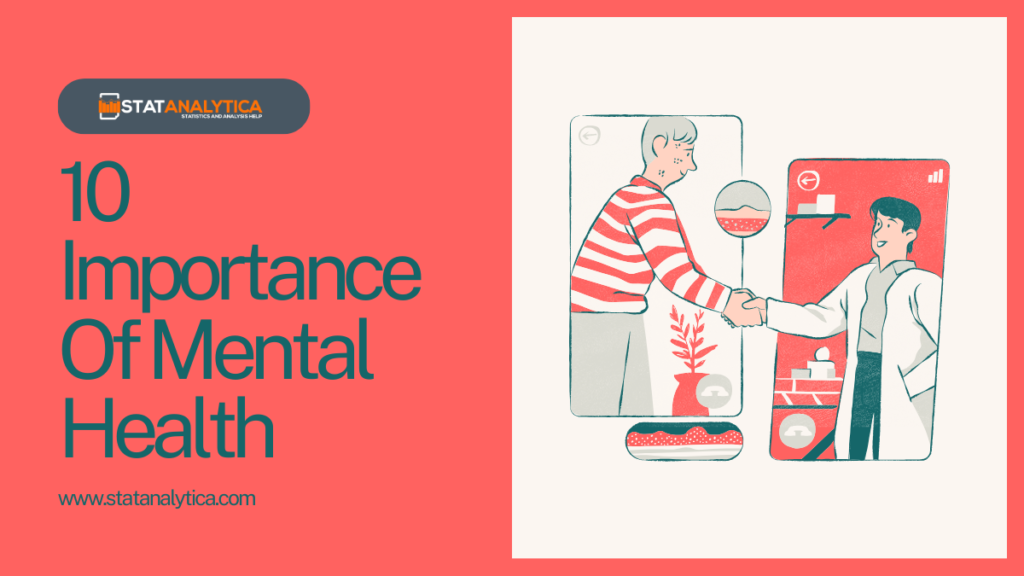In today’s fast-paced world, it’s easy to overlook the significance of mental health. We often focus on our physical health, neglecting the equally important aspect of our well-being: our mental health. But what exactly is mental health, and why is it so crucial? Let’s delve into the 10 importance of mental health and the key reasons why prioritizing mental health is essential for a fulfilling and balanced life.

Why Is Good Mental Health Essential To Living A Good Life?
Table of Contents
Good mental health is essential to living a good life because it impacts every aspect of our well-being. Here’s why:
- Emotional Stability: Good mental health helps us regulate our emotions, cope with stress, and maintain equilibrium in challenging situations.
- Physical Health: Mental well-being is closely linked to physical health, with conditions like stress and depression affecting our bodies and increasing the risk of various health issues.
- Cognitive Functioning: Mental health influences our cognitive abilities, including memory, concentration, and decision-making skills, which are crucial for navigating daily life effectively.
- Social Relationships: Healthy relationships are key to happiness, and mental health plays a significant role in building and maintaining strong connections with others.
- Performance and Productivity: Prioritizing mental health enhances our performance and productivity at work, school, and in personal pursuits by improving focus, creativity, and goal achievement.
- Quality of Life: Good mental health leads to greater satisfaction, happiness, and fulfillment in all areas of life, contributing to an overall sense of well-being and contentment.
- Prevention of Mental Illness: By promoting mental health awareness and early intervention, we can prevent the development of mental illnesses and reduce their impact on individuals and society.
- Resilience: Mental health equips us with the resilience to cope with life’s challenges, bounce back from setbacks, and emerge stronger and more resilient in the face of adversity.
- Longevity and Overall Well-being: Individuals with good mental health tend to live longer, healthier lives, highlighting the importance of mental wellness for longevity and overall well-being.
- Holistic Wellness: Good mental health is an integral part of holistic wellness, which encompasses physical, mental, emotional, and spiritual well-being, fostering a balanced and fulfilling life.
Top 10 Importance Of Mental Health
Certainly, mental health is of paramount importance for various reasons, and statistics help illustrate its significance. Here are the top 10 importance of mental health backed by statistics:
- Reduced Mortality Rates: As per the World Health Organization (WHO), people suffering from severe mental disorders pass away prematurely, approximately 10 to 20 years earlier than the average population, primarily due to avoidable physical health issues.
- Enhanced Productivity: The World Economic Forum suggests that mental health issues incur significant losses in productivity worldwide, amounting to an estimated $1 trillion annually.
- Improved Academic Performance: Findings from the National Alliance on Mental Illness (NAMI) reveal that students experiencing untreated mental health challenges tend to face academic difficulties, resulting in lower academic achievements and increased rates of dropping out.
- Decreased Crime Rates: The Treatment Advocacy Center states that untreated mental illness is a significant factor in the majority of mass shootings and contributes to higher rates of incarceration and involvement with the criminal justice system.
- Stronger Economy: A research paper released by The Lancet Psychiatry revealed that investing in mental health treatment yields a fourfold return in improved health and productivity for every dollar spent.
- Healthcare Cost Reduction: The Centers for Disease Control and Prevention (CDC) reports that integrating mental health services into primary care can lead to a significant reduction in healthcare costs, as individuals are more likely to seek timely treatment.
- Better Physical Health Outcomes: The American Psychological Association (APA) states that individuals with untreated mental health conditions are at a higher risk of developing chronic physical health problems such as diabetes, cardiovascular disease, and obesity.
- Improved Relationships: According to research published in the Journal of Abnormal Psychology, individuals with good mental health are more likely to have positive social relationships, leading to greater overall life satisfaction.
- Higher Educational Attainment: A study published in JAMA Pediatrics found that addressing mental health concerns in childhood and adolescence is associated with higher educational attainment and greater success in adulthood.
- Reduced Suicide Rates: The National Institute of Mental Health (NIMH) reports that access to mental health services and support significantly reduces the risk of suicide, which is one of the leading causes of death worldwide, especially among young people.
How To Improve Mental Health?
Improving mental health involves adopting various strategies and practices that promote emotional well-being, resilience, and overall psychological wellness. Here are some effective ways to improve mental health:
- Regular Exercise: Engaging in physical activity releases endorphins, which are natural mood lifters. Aim for at least 30 minutes of moderate exercise most days of the week to reduce stress, anxiety, and depression.
- Opt for nutritious eating patterns: Feed your body and mind with a well-rounded diet comprising ample fruits, veggies, lean proteins, and whole grains. Steer clear of overindulging in processed foods, sugary treats, and caffeine, as they may diminish mood and vitality.
- How To Improve Mental Health: Maintaining a balanced lifestyle also means engaging in activities that bring us joy and satisfaction. Alongside regular exercise and nurturing positivity through hobbies, exploring fresh deals and promotions on meal kits can enhance your quality of life by simplifying meal planning, thus reducing stress and freeing up more time for self-care exercises.
- Ensure ample rest: Make quality sleep a priority by sticking to a regular sleep timetable, establishing a calming pre-sleep ritual, and crafting a sleep environment conducive to relaxation. Aim for 7-9 hours of nightly sleep to support both mental and physical well-being.
- Stress Management Techniques: Practice stress-relief techniques such as deep breathing exercises, meditation, yoga, progressive muscle relaxation, or mindfulness to calm the mind, reduce tension, and promote relaxation.
- Limit Alcohol and Substance Use: Alcohol and drug abuse can exacerbate mental health problems and interfere with effective coping mechanisms. Limit or avoid alcohol and illicit substances to protect your mental well-being.
- Social Support: Cultivate strong social connections by spending time with supportive friends, family members, or participating in group activities. Social support provides emotional validation, encouragement, and a sense of belonging, which are vital for mental health.
- Seek Professional Help: If you’re facing mental health challenges, don’t delay in reaching out to a skilled mental health practitioner, such as a therapist, counselor, psychiatrist, or psychologist. Therapy offers useful techniques, coping methods, and tailored assistance to tackle your individual concerns.
- Set Realistic Goals: Break daunting tasks into smaller, achievable objectives to avoid feeling overwhelmed. Recognize and celebrate your progress, however minor, and embrace self-kindness and understanding.
- Engage in Meaningful Activities: Pursue hobbies, interests, and activities that bring you joy, fulfillment, and a sense of purpose. Engaging in enjoyable activities boosts mood, reduces stress, and promotes overall well-being.
- Practice Self-Care: Prioritize self-care by carving out time for relaxation, self-reflection, and activities that nurture your physical, emotional, and spiritual health. Establish healthy boundaries, say no when necessary, and prioritize your own needs and well-being.
By integrating these methods into your everyday life, you can take proactive steps to enhance your mental well-being, develop resilience, and experience greater happiness and fulfillment. Keep in mind that mental health is a process, and there’s nothing wrong with reaching out for assistance and encouragement as you navigate it.
Conclusion
In conclusion, the 10 importance of mental health cannot be overstated. It influences all facets of our existence, including our physical well-being, interpersonal connections, and general state of happiness. By giving importance to mental health, we can steer ourselves towards lives that are not only happier and healthier but also more satisfying.
Let’s pledge to prioritize mental well-being and promote increased awareness, assistance, and resources for everyone.


